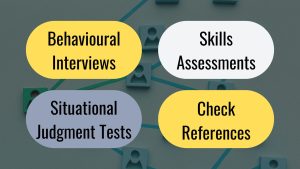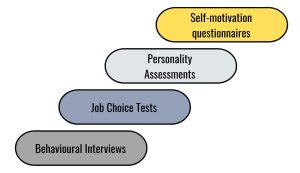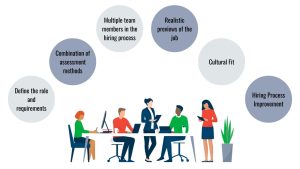Hiring for Remote Work: Key Strategies
Introduction As remote work and team augmentation becomes more common, companies are faced with the challenge of hiring employees who can thrive outside of a traditional offic...

Introduction
As remote work and team augmentation becomes more common, companies are faced with the challenge of hiring employees who can thrive outside of a traditional office environment. Remote work requires a unique combination of skills, particularly adaptability and self-motivation. These traits are critical to ensuring productivity, engagement, and long-term success. Here’s a comprehensive guide on how to assess the adaptability and self-motivation of potential remote employees during the hiring process.
Understanding the Importance of Adaptability and Self-Motivation in Remote Work
Adaptability is the ability to adjust to new conditions, learn new skills, and cope with unexpected challenges. In a remote work environment, employees must be able to manage changing priorities, embrace new technologies, and maintain productivity despite potential distractions at home.
Self-motivation is the internal drive to achieve goals and maintain productivity without constant supervision. Remote workers must be able to set their own schedules, stay focused, and meet deadlines.
Remote Work Adaptability Assessment Strategies

- Behavioural Interviews
Behavioural interviews focus on how candidates have handled situations in the past, which provides insight into their adaptability. Ask questions like:
- “Can you describe a time when you had to quickly learn a new tool or technology?”
- “Tell me about a time when you had to adjust to a significant change at work. How did you handle it?”
- “How do you handle multiple priorities and sudden changes in your work process?”
- Situational Judgment Tests (SJTs)
SJTs present hypothetical work-related scenarios and ask candidates to choose the best course of action. These tests help assess how a candidate might respond to unexpected changes or challenges in a remote work environment.
- Skills Assessments
A hands-on skills assessment can reveal a candidate’s ability to learn new tools or adapt to new challenges. For example, you might provide a short project that requires using unfamiliar software or tools, then assess how quickly and efficiently the candidate learns and completes the task.
- Check References
Talk to previous employers or colleagues to get a sense of the candidate’s adaptability. Ask specific questions about their ability to cope with change, learn new skills, and handle unexpected challenges.
Strategies for Assessing Self-Motivation in Remote Work

- Behavioural Interviews
Behavioural interview questions can also assess self-motivation. Try asking:
- “Can you give an example of a project you had to work on alone? How did you stay motivated and meet deadlines?”
- “Describe a time when you set a personal goal and achieved it. What steps did you take to stay on track?”
- “How do you prioritise your tasks when you have multiple deadlines?”
- Job Choice Tests
Job choice tests involve giving candidates a task that reflects the actual work they will do on the job. This approach allows you to observe their ability to manage their time, stay focused, and produce quality work independently.
- Personality Assessments
Personality assessments, such as the Big Five personality traits, can provide insight into a candidate’s level of self-motivation. Look for traits like conscientiousness, which is often associated with dependability, organisation, and a strong work ethic.
- Self-motivation questionnaires
Administer questionnaires designed to measure intrinsic motivation. Questions might include:
- “How do you stay motivated when working on a long-term project?”
- “What strategies do you use to stay focused when working from home?”
- “How do you deal with distractions or interruptions when working remotely?”
Create a Comprehensive Hiring Process

- Clearly define the role and requirements
Clearly describe the skills, traits, and experience needed to work remotely. Include specific requirements around adaptability and self-motivation.
- Use a combination of assessment methods
Use a combination of interviews, tests, and assessments to get a full picture of each candidate’s suitability for remote work. Using multiple methods reduces the risk of bias and provides a more comprehensive assessment.
- Involve multiple team members in the hiring process
Involve different team members in the interview and assessment process to gather different perspectives. Team members familiar with remote work can provide valuable insight into a candidate’s potential suitability.
- Provide realistic previews of the job
Offer candidates a realistic preview of what the job entails, including potential challenges and the level of autonomy expected. This helps ensure that candidates clearly understand the role and are truly prepared to work remotely.
- Assess Cultural Fit
Assess whether candidates align with your company’s values and culture. A strong cultural fit is essential for long-term engagement and satisfaction, especially in a remote work environment where employees can feel isolated.
- Continuously Improve Your Hiring Process
Regularly review and refine your hiring process based on feedback and results. Stay current with best practices and emerging trends in remote work to ensure your strategies remain effective.
Conclusion
Hiring for remote work requires a nuanced approach that emphasises adaptability and self-motivation. By incorporating behavioural interviews, situational judgement tests, skill assessments, and other targeted strategies, you can identify candidates who are a good fit for the challenges and opportunities of remote work. A thorough and thoughtful hiring process will not only help you find the right talent, it will also lay the foundation for a productive and engaged remote workforce.